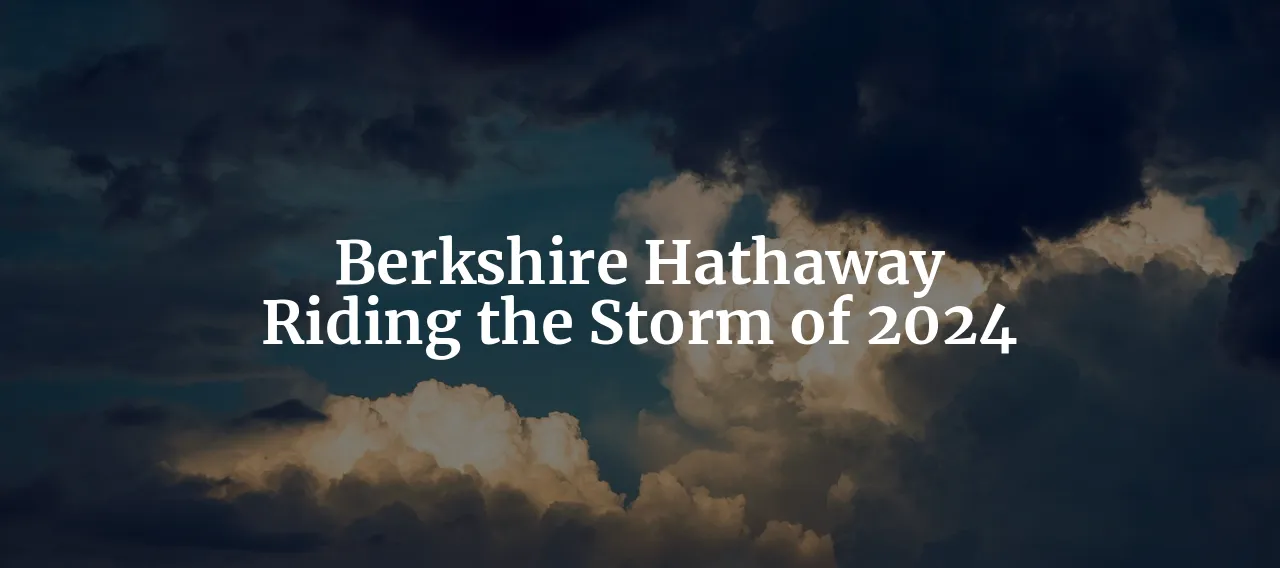Tags: Comments
This fanpage is not officially affiliated with Berkshire Hathaway: Disclaimer
Buckle up, shareholders of Berkshire Hathaway! As we approach the impending recession of 2024, this article dives deep into how the multinational conglomerate and investment firm, under the leadership of Warren Buffett, will weather the storm. From understanding the recession forecast to evaluating Berkshire Hathaway's investment strategy and financial performance, this in-depth analysis provides insights and reassurance for shareholders. With a track record of resilience and a diverse portfolio, Berkshire Hathaway is well-equipped to navigate the challenges ahead and emerge even stronger. So sit back, relax, and trust in Berkshire Hathaway's proven strategies as we ride out this storm together.

Introduction
Berkshire Hathaway, a multinational conglomerate and investment firm, has always been a beacon of stability in the tumultuous world of finance ↗. Renowned for its astute investments and robust financial performance, Berkshire Hathaway has consistently delivered value to its shareholders. However, as we approach 2024, a looming economic storm threatens to disrupt the financial landscape. The anticipated recession, forecasted by The Conference Board and various investment banks, could pose significant challenges to companies worldwide, including Berkshire Hathaway. This article aims to provide an in-depth analysis of how Berkshire Hathaway might weather this impending economic downturn, drawing upon historical trends, economic indicators, and the company's proven resilience.
Section 1: Understanding the Recession Forecast
The Conference Board forecasts a short and shallow recession for the US economy in 2024, with real GDP growth expected to decrease to 0.8 percent. This downturn is attributed to several factors, including elevated inflation, high interest rates, rising consumer debt, and lower government spending. Furthermore, the resumption of mandatory student loan repayments and dwindling pandemic savings are expected to contract consumer spending in the first half of 2024. Investment banks estimate the likelihood of this recession between 15% and 40%, with the yield curve and bond markets indicating a 61% chance of a recession within a year.
These predictions paint a challenging economic landscape, but it's crucial to remember that recessions are part of the economic cycle. They present not only difficulties but also opportunities for companies like Berkshire Hathaway, which has a history of navigating economic downturns successfully. Understanding these forecasts and their underlying factors can help us anticipate potential changes in Berkshire Hathaway's performance and strategy.
Section 2: Berkshire Hathaway's Track Record in Challenging Times
Berkshire Hathaway, under the leadership of Warren Buffett, has demonstrated remarkable resilience during previous economic downturns. The company's diversified portfolio and long-term investment strategy have often allowed it to ride out financial storms and emerge stronger. For instance, during the Great Recession of 2008, while many companies faltered, Berkshire Hathaway capitalized on the market downturn to make strategic investments, such as its $5 billion investment in Goldman Sachs.
This resilience is not accidental but a result of Berkshire Hathaway's unique investment philosophy. The company focuses on acquiring stakes in businesses with strong fundamentals and competitive advantages, which can weather economic downturns and generate long-term value. This approach, coupled with a commitment to maintaining a strong balance sheet, has enabled Berkshire Hathaway to navigate past recessions successfully.
Section 3: Impact on Berkshire Hathaway's Diverse Portfolio
Berkshire Hathaway's diverse portfolio, spanning sectors such as insurance, manufacturing, and retail, could face varying impacts from the impending recession ↗. For instance, the insurance sector, a significant part of Berkshire Hathaway's portfolio, may experience increased claims due to economic hardship. However, it may also benefit from higher premiums in a high-inflation environment.
On the other hand, the company's investments in manufacturing and retail could face challenges due to decreased consumer spending and potential supply chain disruptions. Yet, some companies within Berkshire Hathaway's portfolio may find opportunities amid the crisis. For example, Berkshire's investments in utilities and energy could benefit from potential increases in oil prices.
Section 4: Evaluating Berkshire Hathaway's Investment Strategy
Berkshire Hathaway's investment strategy, characterized by its long-term focus and emphasis on strong business fundamentals, may serve the company well during the recession. However, the company might need to make some adjustments in light of the changing economic landscape. For instance, the projected rise in interest rates, as indicated by Federal Reserve officials and economists, could influence Berkshire Hathaway's investment decisions.
Higher interest rates make borrowing more expensive, which could affect the profitability and cash flow of companies in Berkshire Hathaway's portfolio. However, they also increase the returns on cash and fixed-income investments, which Berkshire Hathaway holds in considerable amounts ↗. Therefore, the company might need to balance these factors when making investment decisions during the recession.
Section 5: Berkshire Hathaway's Financial Performance and Outlook
As of October 27th, 2023, Berkshire Hathaway's stock price stood at $332.65, with a market capitalization of $725.462 billion. The company's financial performance and robust balance sheet place it in a strong position to weather the impending recession. However, the economic downturn could impact Berkshire Hathaway's revenue, earnings, and stock performance.
The company's ability to generate cash flow will be crucial in navigating the recession. Berkshire Hathaway's diverse portfolio and strong cash reserves could provide a buffer against potential revenue declines in certain sectors. Furthermore, the company's conservative financial management, characterized by low debt levels and high liquidity, could help it withstand financial shocks and capitalize on investment opportunities that may arise during the recession.
Section 6: Warren Buffett's Perspective and Leadership
Warren Buffett's leadership and investment philosophy have been instrumental in guiding Berkshire Hathaway through past economic downturns. His emphasis on investing in businesses with strong fundamentals and competitive advantages has proven successful in generating long-term value, even in challenging economic conditions. Moreover, Buffett's long-term perspective and patience often allow Berkshire Hathaway to capitalize on distressed assets or investments during recessions.
Buffett's statements during past recessions provide insights into his approach. For instance, during the 2008 financial crisis, he famously advised investors to "be fearful when others are greedy and greedy when others are fearful." This contrarian approach underscores Berkshire Hathaway's strategy of finding value amid market turmoil, which could serve the company well in the impending recession.
Section 7: Conclusion - Navigating the Storm as Shareholders of Berkshire Hathaway
The looming recession of 2024 presents a challenging economic landscape for Berkshire Hathaway and its shareholders. However, the company's track record, diverse portfolio, strong financial position, and seasoned leadership suggest that it is well-equipped to weather this storm. As shareholders, it is crucial to maintain a long-term perspective and trust in Berkshire Hathaway's proven strategies and expertise.
While the economic downturn could impact Berkshire Hathaway's short-term performance, the company's resilience and strategic investments could provide opportunities for long-term growth. As Warren Buffett once said, "Someone is sitting in the shade today because someone planted a tree a long time ago." As shareholders of Berkshire Hathaway, we can take comfort in knowing that the company has been planting these trees for decades, preparing for times like these.
Conclusion
The looming recession of 2024 presents significant challenges for the global economy and companies like Berkshire Hathaway. However, history has shown that Berkshire Hathaway, under the leadership of Warren Buffett, has the ability to navigate such economic storms successfully. The company's diverse portfolio, robust financial performance, and long-term investment strategy place it in a strong position to weather the impending recession. As shareholders, we should remain informed, maintain a long-term perspective, and trust in Berkshire Hathaway's proven strategies and expertise. As we ride out this storm, we can take solace in the knowledge that Berkshire Hathaway has weathered many storms before and emerged even stronger.
References
- www.conference-board.org: Economic Forecast for the US Economy
- investorplace.com: Is a Recession Coming in Early 2024? These Analysts Say Yes!
- www.investopedia.com: Fed Official, Forecasters See More Rate Hikes Ahead
- finance.yahoo.com: Berkshire Hathaway Inc. (BRK-B) Stock Price, News, Quote & History - Yahoo Finance











